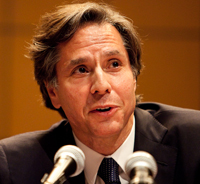
Antony Blinken addressing NED/USHMM event on Srebrenica massacre.
U.S. credibility in advancing democracy and human rights worldwide was damaged by the violent insurrection at the US Capitol on January 6, Secretary of State Antony Blinken argued this week.
But it would be a shame if the Capitol attack causes policymakers to conclude the United States has so badly tainted its reputation as a democracy that it has no place doing promoting democracy around the world, advocates argue. For one thing, that would leave democracy activists and political dissidents more vulnerable than they already are amid a global trend of democratic backsliding in places such as Turkey, Poland and Hungary and worsening authoritarianism in Venezuela, Russia and China, says Rachel Oswald.
Péter Krekó, a social psychologist who directs the Political Capital Institute, a Budapest-based think tank, said what happened on Jan. 6 serves as an important reminder for pro-democracy forces everywhere about the fragility of the political system, even in the world’s most well-known democracy, she writes for Roll Call.
 “What happened in the U.S. Capitol for me is, unfortunately, the textbook case of how tribal rhetoric and this division between good and evil that frequently appeared in Donald Trump’s speeches, how the ongoing polarization trend in the U.S. for almost two decades, and how the conspiracy theories such as QAnon can finally catalyze violence and how it can undermine democratic values,” said Krekó (right), who is researching democratic backsliding in Central and Eastern Europe as a Reagan-Fascell fellow at the U.S.-government funded National Endowment for Democracy (NED).
“What happened in the U.S. Capitol for me is, unfortunately, the textbook case of how tribal rhetoric and this division between good and evil that frequently appeared in Donald Trump’s speeches, how the ongoing polarization trend in the U.S. for almost two decades, and how the conspiracy theories such as QAnon can finally catalyze violence and how it can undermine democratic values,” said Krekó (right), who is researching democratic backsliding in Central and Eastern Europe as a Reagan-Fascell fellow at the U.S.-government funded National Endowment for Democracy (NED).
Pippa Norris, a political scientist at Harvard who examined different levels of dissatisfaction in democratic countries in “Is Western Democracy Backsliding?” finds evidence supportive of less polarized systems, writes for the Times:
Parliamentary democracies with PR elections and stable multiparty coalition governments, typical of the Nordic region, generate a broader consensus about welfare policies addressing inequality, exclusion, and social justice, and this avoids the adversarial winner-take-all divisive politics and social inequality more characteristic of majoritarian systems.
Secretary of State Blinken expressed a degree of optimism, stating that he sees the “glass as half full” because “I think we have a very strong story to tell about the resilience of democracy, the resilience of our institutions and the determination of this country to always try to form a more perfect union.”

Credit: NDI
“The last thing that small ‘d’ democrats would want to see around the world is the United States retreat,” said Ken Wollack (right), chairman of the NED board. “There isn’t an inconsistency with working on our own democratic system and helping others who are engaged in promoting or sustaining their democratic systems.”
The reporter of this story was a Penn-Kemble Democracy Forum fellow at the National Endowment for Democracy in 2016-2017.







